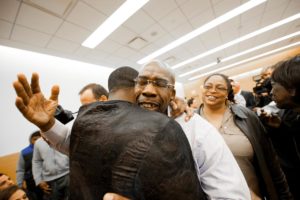Jonathan Fleming is now a free man.
In an outrageous injustice, Fleming, now 51, spent 24 years in prison for a murder he said all along he didn’t commit—and it turns out prosecutors and police in New York withheld the evidence that would have proved that Fleming was telling the truth.
“Where the hell was this evidence all these years, and why wasn’t it turned over until 25 years later?” attorney Taylor Koss asked as Fleming was released from Washington Correctional Facility in Comstock, N.Y.
After a judge dismissed the case, an emotional Fleming tearfully hugged his lawyers while his family members cheered him on.
“After 25 years, come hug your mother,” Patricia Fleming said to her only child, as he walked over and enfolded her in his arms.
“I feel wonderful,” he said afterward. “I’ve always had faith. I knew that this day would come someday.”
But the questions are now swirling around New York law enforcement, who surely will be facing legal action initiated by the newly freed man.
For the past year, attorneys Koss and Anthony Mayol joined a team from the private investigative firm Management Resources to collect evidence proving Fleming’s innocence—and it turns out there was plenty.
Fleming had been saying for 25 years that he was on vacation at Disney World in Orlando, Fla., on Aug. 15, 1989, when his friend Darryl Rush was gunned down outside a Brooklyn housing project.
“He told his attorney he had in his pocket at the time of his arrest a phone receipt from paying a phone bill at [a Florida] hotel late in the evening of Aug. 14, 1989,” Koss told reporters. “The receipt was pretty strong alibi evidence. His attorney went to the district attorney’s office and asked for the receipt, and they said they did not have it. The police detectives also denied ever recovering the phone receipt. Fast-forward 25 years and the case file is opened again, and there is the phone receipt.”
Koss said that the receipt shows Fleming paid a phone bill at an Orlando hotel at 9:30 p.m. on Aug. 14, 1989—about four hours before Rush’s slaying.
In addition, Koss said Orlando police did their own investigating.
“[Orlando police], investigating it in Florida on behalf of New York investigators, said they found multiple employees at the hotel who saw Mr. Fleming. That was another great piece of evidence showing him in Florida on August 16.”
While those two pieces of evidence would have likely persuaded a jury not to convict Fleming of second-degree murder, a key witness also recanted.
The woman initially claimed she was sitting next to a window in her house that night and saw Fleming shoot Rush—testimony that led to Fleming’s conviction of second-degree murder and a sentence of life in prison. But in the months after Fleming’s trial, the woman recanted her testimony, saying she had identified Fleming as the shooter in exchange for dismissal of an unrelated felony charge that she was facing.
”I was scared, nervous and on probation … so I lied,” the woman wrote in a signed affidavit.
Even more egregious, the woman alleged that she told investigators the truth prior to testifying at trial, but was threatened with arrest for perjury if she backed down. The recantation came out during Fleming’s appeal hearing, but the judge let the jury verdict stand.
Brooklyn District Attorney Kenneth P. Thompson said in a press release Tuesday that his office was dismissing murder charges against Fleming following a re-examination of the case by the DA’s Conviction Review Unit.
“Today’s actions follow a careful and thorough review of this case, and based on key alibi facts that place Fleming in Florida at the time of the murder, I have decided to dismiss all charges against him in the interest of justice,” Thompson said.
Koss said they now believe they know who is responsible for the shooting.
“There are two new witnesses, one of which admits to being the getaway driver from the shooting,” Koss said. “He has come forward and given a sworn statement. He said Mr. Fleming was not a part of this in any way, shape or form, and he has identified who he claims is the actual shooter.”
As for Fleming, “he is very happy that this day has finally come, but it’s an emotional day that’s tempered by the realization that he had to suffer in a jail cell the last 24 years, knowing he was an innocent man,” Koss said.



